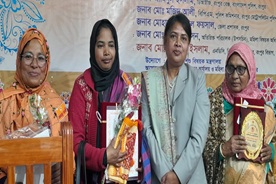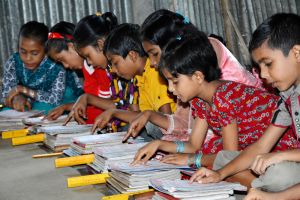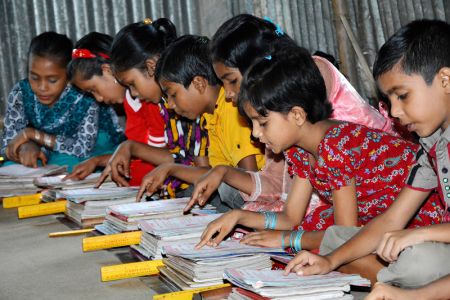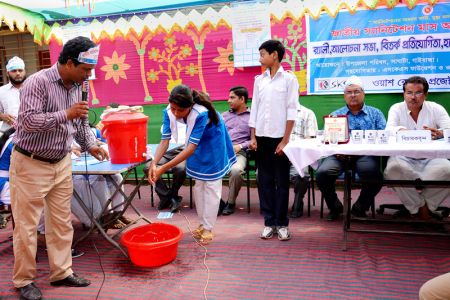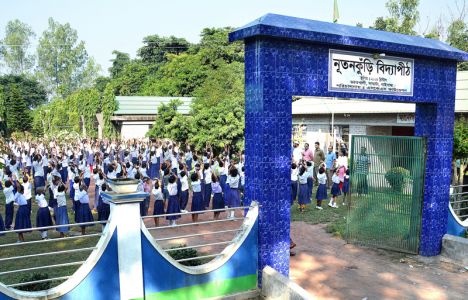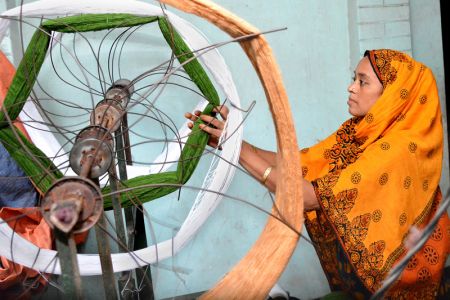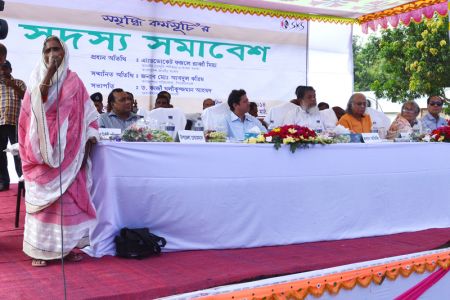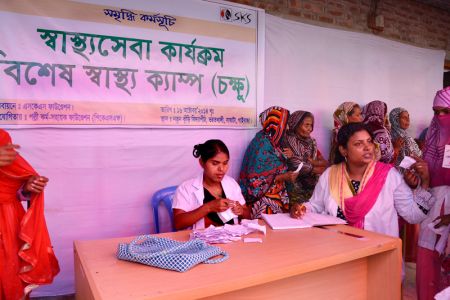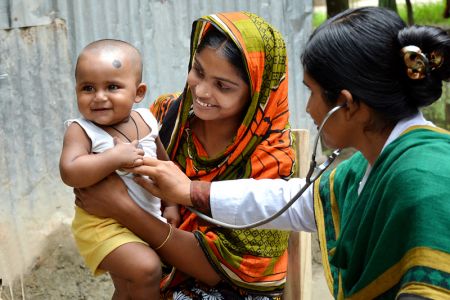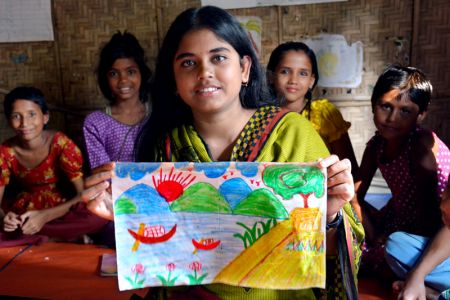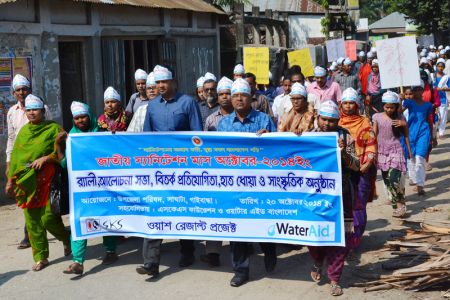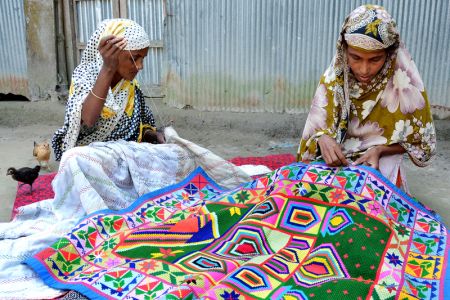Strategy:
Bangladesh is a country prone to various devastating natural disasters such as flood, cyclone, droughts, river erosion etc. These cause immense loss of life and assets. Though risk reduction and preparedness have drastically reduced the numbers of deaths, loss and damage to personal and productive assets. Since 1987, Bangladesh experienced 40 major natural disasters, most of which were cyclone, flood and flood related erosion taking a heavy toll on the economy as well as on life, security and livelihood of poor people. Frequent disasters effect and reduce the coping mechanism of vulnerable communities, which is the prime factor of prevailing poverty. It has been observed during various natural disasters that women, excluded and marginalized communities are most affected and their poverty deepens due to frequent occurrence of natural disaster. The government has developed policies and practices for disaster response, which clearly enshrines the right of affected populations to assistance in disasters. Promote Disaster Risk Reduction (DRR) strategy is the ways to reduce loses of life and assets in disaster prone area.
Objectives:
To strengthen resilience capacity of disaster affected community.
Major activities:
- Conduct Participatory Vulnerability and Capacity Assessment (PVCA)
- Promote preparedness activities at household level.
- Facilitate for strengthening community based disaster risk reduction mechanism.
- Infrastructure development for disaster risk reduction.
- Improve livelihood options of disaster affected community to prepare them for coping with disaster.
- Functioning disaster early warning system.
- Sensitizing duty bearers effective function and response.
- Emergency response, recovery and rehabilitation.
Strategy:
Bangladesh is frequently cited as one of the most vulnerable countries to climate change because of its disadvantageous geographic location; flat and low-lying topography; high population density; high levels of poverty; reliance of many livelihoods on climate sensitive sectors, particularly agriculture and fisheries; and inefficient institutional aspects. Many of the anticipated adverse affects of climate change, such as sea level rise, higher temperatures, enhanced monsoon precipitation, and an increase in cyclone intensity, will aggravate the existing stresses that already impede development in Bangladesh, particularly by reducing water and food security and damaging essential infrastructure. These impacts could be extremely detrimental to the economy, the environment, national development, and the people of Bangladesh. Bangladesh has developed some capacity for dealing with the impacts of climate change at the national level, and policy response options have been mobilized that deal with vulnerability reduction to environmental variability in general, and more recently, to climate change in particular. In addition, Bangladesh has for some time been recognized as a particularly vulnerable country by the international community, and has received disaster management and adaptation support in several sectors. SKS will take part to deal with climate change vulnerability particularly in northern part of Bangladesh.
Objectives:
Enhance capacity of community peoples to adapt with affects of climate change.
Major activities:
- Awareness building on climate change issue.
- Facilitate for community based actions to adapt with affects of climate change.
- Action research for finding climate change adaptation mechanism.
- Organize advocacy of climate change issue.
Strategy:
Bangladesh is a developing country. Considering the present socio- economic situations of Bangladesh, SKS works in the financial services and it’s a very important work. SKS work for the financial services for changing the economical and social position of the poor and the poorest people.
Objective:
Increasing financial transaction and creating new employment opportunity for people.
Activities:
Under this program SKS works in Micro credit, micro entrepreneurship, Agriculture loan, Livestock loan, Health activities loan, Savings activities, Training support and others financial activities done smoothly. In this program, the financial transaction is increased and new employment is created for the people. Financial Service program improves the Agricultural sector, Health sector. Also creates small and medium entrepreneur and enterprise. This program also supports the national financial activities.
Strategy:
The poor people can not change their socio-economic condition due to lack of knowledge and skill. As a result, they are lacking behind and becoming victim of torture and exploitation. Besides this, they are deprived of different services for the lack of service providing institution and their own ignorance. It is very urgent to increase their capacity for developing the socio-economic condition of the poor people in our country. For this reason, SKS Foundation has been implementing capacity building program to develop the capacity and skill of the poor people in the target group. These are, sewing training, poultry rearing, cow rearing, beef fattening, cross cutting the nursery, using LCC, using fertilizer etc. Capacity is being increased under the capacity building program in the basis of poor women and poor people though the organizing, orientation, workshop and training activities. As a result, poor male and female are utilizing their practical knowledge and skill and change their socio-economic condition.
Objective:
Building Capacity of poor people for improving their socio-economic condition.
Activities:
The main activities of capacity building programs are given below:
- Support the poor people for developing their knowledge and skill.
- Prepared planning locally through their participation and play great role for implementation.
- Proper utilization of local resources and motivation to the stakeholders.
- Establish communication with the service provider institution both in govt. or non government organization and advocacy for getting the services./strong>
Strategy:
Micro Entrepreneurship means small business that leads by the business owner a productive, service provider and a common business institution where the people’s employment is created besides the business ownership. Entrepreneurship contributes a great deal in the development of economy. Like the big business institutions, entrepreneurship institutions also contribute greatly in national gross profit. On the other hand, it contributes to the development of the community and the society. Like other developing country, Bangladesh economy is turning like the vicious circle of poverty. The general characteristics of these countries are:
Less income for the people which results to less savings, decrease in the investment and the creation of employment opportunities is being hampered. In this way, the circle is turning. The active way to come out of the circle is to accelerate the entrepreneurship in the whole country and the micro credits has shown a great success by utilizing the loan by the poor man and women in the village and transform them as a entrepreneurship. As a consequence, SKS Foundation has been implementing the micro credit in 70 branches in the district of Bogra, Rangpur and Gaiabandha in the northern part of Bangladesh. At present, micro entrepreneurship members are 1091 and outstanding loan is Tk. 51,503,575.00
Objective:
SKS Foundation is implementing the micro credit activities with the following objectives:
- Socio-economic development in the poor and marginal people of Urban and village.
- New employment opportunities creation as well as the increase of income in the poverty of Urban and village.
- Loan support for the entrepreneurs and the encouragement in the investment and productive activities.
- Creation the opportunities for getting the permanent resources.
- Increase the household income and creation of social infrastructure for the poor people like education, health etc.
- New employment opportunities creation as well as the income of poor and marginal people centrally in the village market.
Activities:
SKS Foundation is implementing the micro credit in the following sector:
| SL No |
Sector of Investment |
Micro enterprise Sector |
|
01 |
Production and creation of employment opportunities |
Mini garments, Tailoring, Grocery, Soap making factory, Hand Loom, Bamboo culture, Cow rearing, Bakery business, Sweet Shop, Kantha stitching, Shoe making, Yard Long bean, Handicraft, etc. |
|
02 |
Creation of employment opportunities |
Grocery, Medicine, Tailoring shop, Shoe market, kasha Pitol and Iron |
|
03 |
Service related activities |
Hire power teller, Solar and generator, CNG, Mini Truck |
|
04 |
Agriculture based |
Nursery, Fruit Garden, vegetable cultivation, Litchi Garden, Fish culture, Cow rearing and Livestock's. etc. |
SKS Foundation has provided the following training in the micro entrepreneurship sector:
- Business related planning, controlling and accounting.
- Training on how to repay installments.
- Training on service charge.
- Proper utilization of loan.
- Creation of mentality for savings.
- Training on right labour management.

